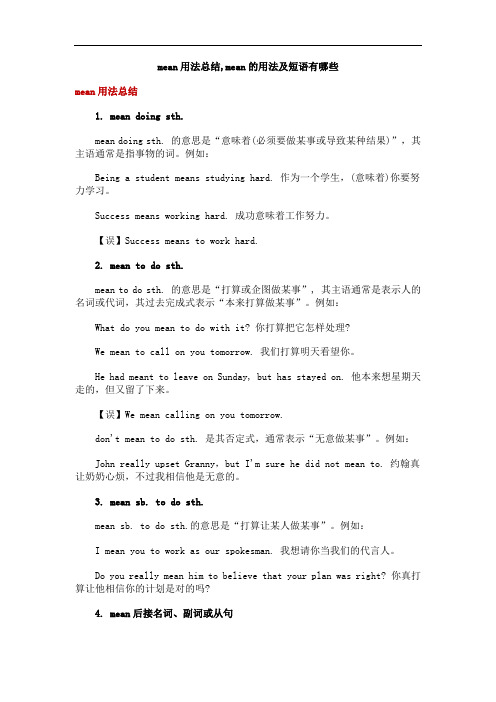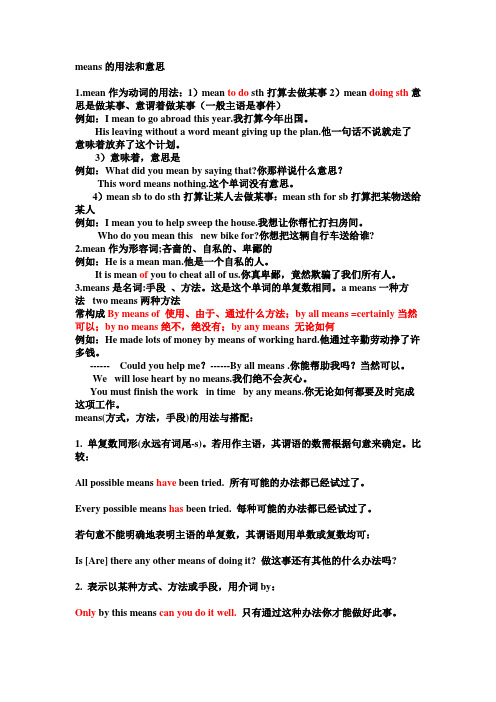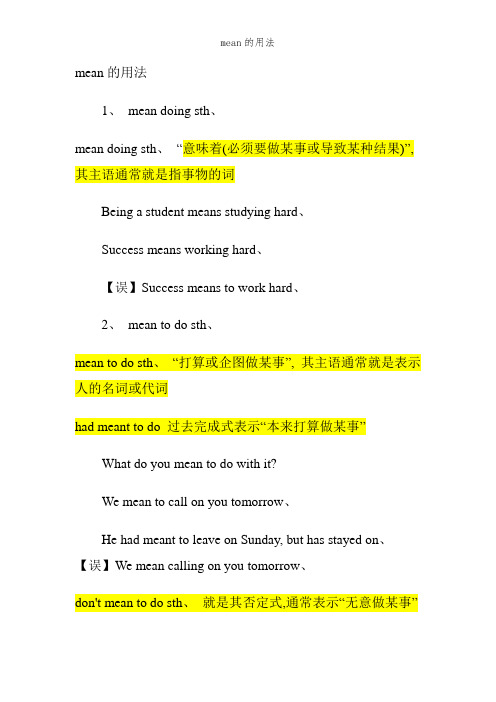mean的用法与搭配
Mean的用法

4. mean后接名词、副词或从句 mean后接名词或副词,意为“表 示;打算;存心”等意思;后接 that 从句,意为“表示……”。例如: “I meant well,”he said. 他说, “我是好意。” The sign means that the road is blocked. 这个标志表示此路不通。
6. What do / did you mean by...? 该句型的意思是“你……是什么意思?” 例 如: What do you mean by acting like this? 你 这样做是什么意思? 7. be meant for 该短语的意思是“打算给予;打算作…… 用”。例如: What is this meant for? 这准备作什么用? These rooms are meant for the children's centre. 这些房间是打算用作少年活动中心的。
8. I mean I mean 的意思是“就是说;我是说” 的意思,常用来更正或补充前面所说的话。 例如: She is smart—I mean, she knows exactly what I think. 她很聪明——我的意 思是说,她完全知道我的想法。 Well, eh yes, I mean no. I mean, I found the bathroom, but I didn't find what I was looking for! 嗯,呃,是呀,我的意 思是没有。我是说我找到了浴室,但我没 找到我在找的东西!
Mean的用法
1. mean doing sth. mean doing sth. 的意思是“意味 着(必须要做某事或导致某种结果)”, 其主语通常是指事物的词。例如: Being a student means studying hard. 作为一个学生,(意味着)你要努 力学习。 Success means working hard. 成 功意味着工作努力。
初中英语-mean用法总结

mean用法总结,mean的用法及短语有哪些mean用法总结1. mean doing sth.mean doing sth. 的意思是“意味着(必须要做某事或导致某种结果)”,其主语通常是指事物的词。
例如:Being a student means studying hard. 作为一个学生,(意味着)你要努力学习。
Success means working hard. 成功意味着工作努力。
【误】Success means to work hard.2. mean to do sth.mean to do sth. 的意思是“打算或企图做某事”, 其主语通常是表示人的名词或代词,其过去完成式表示“本来打算做某事”。
例如:What do you mean to do with it? 你打算把它怎样处理?We mean to call on you tomorrow. 我们打算明天看望你。
He had meant to leave on Sunday, but has stayed on. 他本来想星期天走的,但又留了下来。
【误】We mean calling on you tomorrow.don't mean to do sth. 是其否定式,通常表示“无意做某事”。
例如:John really upset Granny,but I'm sure he did not mean to. 约翰真让奶奶心烦,不过我相信他是无意的。
3. mean sb. to do sth.mean sb. to do sth.的意思是“打算让某人做某事”。
例如:I mean you to work as our spokesman. 我想请你当我们的代言人。
Do you really mean him to believe that your plan was right? 你真打算让他相信你的计划是对的吗?4. mean后接名词、副词或从句mean后接名词或副词,意为“表示;打算;存心”等意思;后接 that 从句,意为“表示……”。
means的用法和意思

means的用法和意思1.mean作为动词的用法:1)mean to do sth打算去做某事2)mean doing sth意思是做某事、意谓着做某事(一般主语是事件)例如:I mean to go abroad this year.我打算今年出国。
His leaving without a word meant giving up the plan.他一句话不说就走了意味着放弃了这个计划。
3)意味着,意思是例如:What did you mean by saying that?你那样说什么意思?This word means nothing.这个单词没有意思。
4)mean sb to do sth打算让某人去做某事:mean sth for sb打算把某物送给某人例如:I mean you to help sweep the house.我想让你帮忙打扫房间。
Who do you mean this new bike for?你想把这辆自行车送给谁?2.mean作为形容词;吝啬的、自私的、卑鄙的例如:He is a mean man.他是一个自私的人。
It is mean of you to cheat all of us.你真卑鄙,竟然欺骗了我们所有人。
3.means是名词:手段、方法。
这是这个单词的单复数相同。
a means 一种方法two means两种方法常构成By means of 使用、由于、通过什么方法;by all means =certainly当然可以;by no means绝不,绝没有;by any means 无论如何例如:He made lots of money by means of working hard.他通过辛勤劳动挣了许多钱。
------ Could you help me?------By all means .你能帮助我吗?当然可以。
We will lose heart by no means.我们绝不会灰心。
mean的用法与搭配

mean的用法与搭配
mean,中文名叫“意思是”,是英语中非常常用的一个动词,意思是“意图,打算,表达”。
其搭配用法有很多,广泛应用于句中的不同成分。
1、 mean(v.) + n. 意思是:
例如:What do you mean by that?
你这句话到底是什么意思?
2、 mean(v.) + to(v.)意思是:
例如:I don’t mean to make you angry.
我不是故意让你生气的。
3、 mean(adj.) + to(v.)意思是:
例如:He was mean to her.
他对她很残忍。
4、 mean(v.) + that 意思是:
她是说她不会来参加聚会了吗?
5、 be meant to (v.)意思是:
例如:I was meant to take the lead in the project.
我被安排作为这个项目的负责人。
可见,mean作为英语中的一个非常重要的动词,在各种句式中有着
非常广泛的应用,因此必须掌握其各种搭配用法,以便更好地掌握英语。
mean的14种用法解释

mean 的14种用法解释vt. 意味;想要;意欲过去式 meant过去分词 meant现在分词 meaning ]1、mean vt. 表示…的意思;意思是;If you can bear with me a little longer, you will see what I mean. 如果你能再容忍我一会儿,你就会明白我的意思了。
Don't juggle with words any more. I know what you mean. 不要再玩文字游戏了,我知道你是什么意思。
She never meant anything of the sort.她决没有那种意思。
What does this word mean?这个词是什么意思?So what does this all mean? 则这都意味着什么呢.I mean, what is this? 我的意思是这是什么.They do not know what the words mean. 他们不知道这些字的意思是什么。
Yeah I see what you mean. 是的,我明白你的意思。
I mean I like both of the panies. 我的意思是这两家公司我都喜欢。
I mean this one, not that one.我指的是这个, 不是那个。
I mean business.我是当真的。
He means this house for his daughter.他预定把这栋房子给女儿。
2、意味着;即是:Money means nothing to her.她视金钱如粪土。
Health means everything.安康就是一切。
The dark clouds mean rain.乌云意味着要下雨。
His promotion means a raise in salary.他的提升意味着要增加薪水。
mean的用法

mean的用法1、mean doing sth、mean doing sth、“意味着(必须要做某事或导致某种结果)”,其主语通常就是指事物的词Being a student means studying hard、Success means working hard、【误】Success means to work hard、2、mean to do sth、mean to do sth、“打算或企图做某事”, 其主语通常就是表示人的名词或代词had meant to do 过去完成式表示“本来打算做某事”What do you mean to do with it?We mean to call on you tomorrow、He had meant to leave on Sunday, but has stayed on、【误】We mean calling on you tomorrow、don't mean to do sth、就是其否定式,通常表示“无意做某事”John really upset Granny,but I'm sure he did not mean to、3、mean sb、to do sth、mean sb、to do sth、的意思就是“打算让某人做某事”。
例如: I mean you to work as our spokesman、Do you really mean him to believe that your plan was right?4、mean后接名词、副词或从句mean后接名词或副词,意为“表示;打算;存心”等意思;后接that 从句,意为“表示……”。
例如:“I meant well,”he said、她说,“我就是好意。
”The sign means that the road is blocked、5、mean用来解释某个词语的含义mean 可用来解释某个词语的含义,表示“意思就是……”,其后面的单词形式常与被解释的单词形式保持一致。
mean的用法和固定搭配

mean的用法和固定搭配
1. “Mean”可以表示“意思是”,就像我说“这意味着什么呀”!比如“She said she was tired. I mean that she really needed a rest.(她说她累了。
我的意思是她真的需要休息。
)”
2. 咱还能说“be mean to”,就是“对……刻薄”,哎呀,你可别“be mean to”别人呀!像“He is always mean to his classmates.(他总是对他的同学们刻薄。
)”
3. “mean business”也挺常用呀,意思是“认真的”,就好比说“他这次是认真的”。
例如“When she said she would quit, she really meant business.(当她说她要辞职时,她是认真的。
)”
4. “mean well”表示“出于好意”,这不是常有的事儿嘛,“她虽然做得不好,但也是出于好意呀”!举个例子“She may be strict, but she means well.(她也许很严格,但她是出于好意。
)”
5. 还有“what do you mean by...”,就是“你……是什么意思”,这不,“What do you mean by saying that?(你那样说是什么意思?)”
6. “no mean”表示“相当好的,不容易的”,哇塞,“那可真是相当不容易呀”!比如“Winning the competition is no mean feat.(赢得这场比赛是一项相当了不起的成就。
)”
我的观点结论:“mean”的这些用法和固定搭配在日常交流中好实用呀,大家可得牢牢记住并运用起来哟!。
mean的用法及例句

mean的用法及例句一、Mean的基本定义与用法Mean,作为一个多义词,在不同的语境中有着不同的含义与用法。
下面将以常见的意思进行解释并给出相应的例句,帮助大家更好地理解和掌握这个单词。
1. "意味着"的含义Mean在这种情况下常用于表达某事物所代表或暗示的意思。
例如:- The red light means stop. (红灯亮表示停车。
)- His smile meant he was happy. (他微笑说明他很开心。
)2. "打算"或"计划"的含义Mean在这种情况下常用于表达某人对未来事情的打算或计划。
例如:- I mean to study abroad next year. (我打算明年出国留学。
)- They mean to open a new branch in the city center. (他们计划在市中心开设一家新分店。
)3. "讨论"或"谈论"的含义Mean也可表示对话或文章中所要探讨或谈论的主题。
例如:- In her speech, she means the importance of education. (在她的演讲中,她讨论了教育的重要性。
)- This book means the challenges faced by modern society. (这本书讨论了当今社会所面临的挑战。
)4. "意见"或"观点"的含义Mean还可以指代某人对待某事物的态度、意见或观点。
例如:- What do you mean by saying that? (你这么说是什么意思?)- His means of solving the problem are unconventional. (他解决问题的方法很不寻常。
)5. "有意地"或"蓄意地"的含义Mean有时也表示某人故意做了某事,而不是无心之失。
- 1、下载文档前请自行甄别文档内容的完整性,平台不提供额外的编辑、内容补充、找答案等附加服务。
- 2、"仅部分预览"的文档,不可在线预览部分如存在完整性等问题,可反馈申请退款(可完整预览的文档不适用该条件!)。
- 3、如文档侵犯您的权益,请联系客服反馈,我们会尽快为您处理(人工客服工作时间:9:00-18:30)。
mean后接不定式与接动名词■mean to do sth 的意思是:打算(想要)做某事。
此时的主语只能是“人”。
如:I had meant to leave on Sunday.我本打算周日走。
I mean to stay here for a long time.我打算在这儿呆很久。
I mean to get to the top by sunrise. 我打算在日出时到达山顶。
Do forgive me—I didn’t mean to interrupt.真对不起——我不是有意打扰你。
Don’t give me then cold shoulder; I don’t mean to make you angry. 你别冷落我,我不是存心惹你生气的。
To mean to do something and to actually do something are two different things. 打算做一件事和实际上做一件事完全是两回事。
I meant to send the mover yesterday, but forgot. 本来我昨天就想派人把东西送来,可是我给忘了。
I had meant to come, but something happened. 我本想来,但有事就没有来。
mean通常不与否定的动词不定式搭配。
如:I did not mean to hurt you.我并不是故意得罪你。
(不说:I meant not to hurt you.)I meant no harm to you.我对你并无恶意。
(不说:I meant not to harm you.)◎有时接不定式的复合结构。
mean sb. to do sth 要某人干某事,其被动语态为: be meant to do sth如:I was meant to be working on Sunday, but I just fooled around all day.星期日我本应工作的,但却闲混了一整天。
I mean you to go. 我打算让你去。
Did you mean John to post those letters? 你是想叫约翰去寄那些信吗?I believe he is meant to be a soldier.我相信他天生是要当军人的。
eg: I didn’t mean you to read the letter. I never meant him to work for us.You are meant to pay before you come in.Did you mean us to know? 你是有意让我们知道吗?He meant himself to do his best. 他要自己尽最大的努力。
She meant us to help her. 她想让我们帮助她。
No one meant him to be a great man. 没人要他成为伟人。
I mean you to go. 我想让你去。
I mean you to do the exercise by yourself. 我是要你独自完成作业。
Medicines are not meant to live on. 不能靠吃药过日子。
That was meant to be a dig at me. 那是对我的挖苦。
He was meant to be a doctor. 他天生是个医生。
Books are meant to be read. 书就是让人读的。
I believe he is meant to be a soldier. 我相信他天生是要当军人的。
I think you are meant to queue. 我看你得排队。
Library resources are meant to be kept permanently. 图书馆资源会被永久的保存。
Children are meant to be seen and not heard. 大人在说话,小孩莫打岔。
■mean doing sth 的意思是:意味着(要)做某事。
此时的主语不能是“人”。
如:Missing the train means waiting for another hour.赶不上火车预示着要再等一个小时。
Revolution means liberating the productive forces.革命意味着解放生产力。
This means helping you. 这意味着帮助你。
To raise wages means increasing purchasing power. 提高工资意味着增加购买力。
I won’t wai t if it means delaying more than a week. 如果这意味耽误一个多礼拜我就不等。
If we mean to catch the early bus, that means getting up before five. 要想赶早班车,我们就得在5点钟以前起床。
He is determined to get a seat even if it means standing in a queue all night. 即使要整夜排队,他也决心要买到票。
If you want to pass the exam it will mean studying hard. 你想要考试及格,那就意味着要刻苦学习。
◎有时接动名词的复合结构。
如:This new order will mean us working overtime. 这一新定单意味着我们得加班加点。
means的用法与搭配用作名词,主要表示“方式”“方法”“手段”等,使用时注意以下几点:1.单复数同形(永远有词尾-s)。
若用作主语,其谓语的数需根据句意来确定。
如:One means is still to be tried. 有一种办法还没有试行。
All means have been used to get him to change his mind. 为了转变他的想法,所有的办法都用过了。
有时用作主语其单复数意思不明,则谓语可用单数或复数。
如:Is [Are] there any other means of doing it? 做这事还有其他的什么办法吗?The end is good, but the means is [are] bad. 结局是很好,但采取的手段是不好的。
2.表示做某事的方法,其后通常接“of+(动)名词”。
如:There are several means of transport on the island. 岛上有好几种交通工具。
There is no means of finding out what happened. 无法弄清发生了什么事情。
Taking a plane is the quickest means of getting there. 去那儿最快的办法是坐飞机。
有时也可后接不定式,但不如接 of doing sth 常见。
另外有时也可后接 for doing sth, 也不如用 of doing sth 常见。
3.表示以某种方式、方法或手段,通常用介词 by。
如:This money wasn’t earned by honest means.这笔钱不是通过正当手段得来的。
He explained to us the means by which he persuaded her to come. 他给我们说明了他是如何说服她来的。
注意以下与介词 by 连用的常用词组:(1) by means of 意为“依靠”“通过”。
如:We express our thoughts by means of words. 我们用词句来表达思想。
He got into the house by means of an open window. 他从一扇开着的窗户爬进屋去。
(2) by all means 意为“无论如何地”“千方百计地”。
如:This plan must be realized by all means. 这个计划必须千方百计予以实现。
在口语中可以表示“当然可以”。
如:A:May I borrow your paper? 我可以借你的报纸吗?B:By all means. 当然可以。
(3) by no means 意为“绝不”“一点也不”(用于句首,句子要倒装)。
如:I’m by no means happy about his work.我对他的工作一点也不满意。
By no means should he be left alone. 绝不能把他单独留下。
有时可说成not by any means。
如:A foreign language isn’t by any means easy to master.要精通外语绝对不是件简单的事。
means作主语时谓语动词用单数还是复数means 表单数意义还是复数意义? 用作主语时,谓语动词用单数还是复数?如:All possible means __________ been tired.Every possible means __________ been tired.A. have,haveB. has,hasC. have,hasD. has,have此题应选C。
名词means(方法)的单复数同形,用作主语时,其谓语的单复数要视具体含义而定:1.如果means与all,such,these,those等词连用,则其含义应该是复数:These means are very good. 这些方法很好。
Such means sound interesting,but in fact they’reimpossible.那样的方法听起来有趣,但实际上是不可能的。
2.如果means与a,such a,this,that,every等词连用,则其含义应该是单数:Such a means is really unpleasant. 这样的方法确实是令人不愉快。
There is an effective means of doing it. 做此事有一种很有效的方法。
3.有时从句意和上下文无法确定means 到底是单数还是复数,则其谓语用单数或复数均可以:做这事还有其他的什么办法吗?正:Are there any other means of doing it?正:Is there any other means of doing it?没有好的方法。
